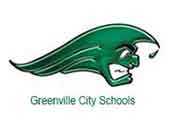|
|
 |
 |
Greenville City Schools
Technology in Today’s
Classroom
Jim Hooper
Just a few short years ago, the term “technology in the classroom”
meant an overhead projector or CD player, or if you were lucky, a SMART
board, which allowed teachers and students to interact with images
projected on a screen. But, as innovations such as tablets were
developed, as educational resources were offered online, and as costs
decreased, more and more schools infused these new technologies into
their curriculums. As technology has become more commonplace in
schools, legitimate questions are often asked: What educational value
does technology have in the classroom? Do students learn better using
technology versus the traditional mode of teaching? Aren’t kids using
technology too much?
The widespread adoption of technology has completely changed how
teachers teach and students learn. Today’s technology enables students
to learn independently and at their own pace. Almost all applications
that a student may use on a device allow for individualized
instruction. This includes remedial instruction for struggling students
as well as accelerated instruction for gifted students. Having
technology as a resource is a great help for teachers who need extra
time with struggling students. When students are able to learn
independently with technology, the teacher can either pull aside a
small group for more individualized instruction or confer with
individual students while they work with technology.
Three years ago, Greenville City Schools introduced iPads into first
grade in a one-to one initiative (an iPad for each student) to provide
help for students in reading and math. Specifically, the iPads were
used with academic programs such as eSpark – an interactive online
program that uses individual student data to target areas where the
student is weakest in reading and math. The school district has
continued to add iPads each year so now all students in grades
Kindergarten through sixth grade have them to use both in the classroom
and at home.
So, how are Greenville’s teachers using this new technology? Students
typically use their iPad for about a half hour each day in the morning
or afternoon – usually with a program such as eSpark – and at other
times throughout the day when appropriate to the day’s lesson, such as
for research. Teachers still provide instruction to their classes and
work individually with students. Some teachers use certain apps to
provide engaging short educational videos or simulations to emphasize
concepts they have already taught. Additionally, many textbooks now
have an online component, so teachers can assign reading or math
homework without having to have the students take their hardbound
textbook home. Quizzes and tests can now be taken online, and
either graded immediately or sent to the teacher for grading. This
reduces the amount of paper used, and eliminates the excuse “My dog ate
my homework.”
Technology continues to prepare students for the future workforce. Nine
out of ten students believe that using technology in the classroom
would help prepare them for the digital future. Jobs that may not have
had a digital component in the past, may have one now. Education is no
longer just about memorizing facts and vocabulary words; it’s about
solving complex problems and being to collaborate with others in the
workforce. These skills are essential in order to be successful in this
day and age.
Technology changes by the minute, and, as educators, we need to keep up
with the times in order to best prepare our students for this
ever-changing world that we live in. Above all, technology should help
facilitate learning in the classroom. Whether providing time for
teachers to work individually with students, engaging students in
interesting work, or allowing for students to work at their own their
own pace, moving classrooms into the 21st century is a priority for
Greenville schools and their students.
|
|
|
|

